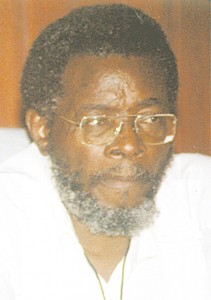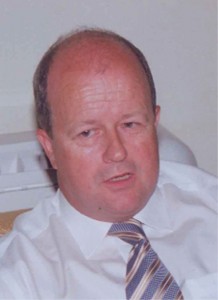Head of the Presidential Secretariat Dr Roger Luncheon has accused the UK’s representatives here of pursuing “ulterior motives” in the management of a £3 million joint project for reforming Guyana’s security sector.

In separate correspondence to President Bharrat Jagdeo and British High Commissioner to Guyana Fraser Wheeler, dated May 6, 2009, Luncheon registered his concern over the motives of the UK’s representatives, saying he was disturbed by “offensive” proposals which, according to him, suggest that Guyana is “totally incapable” of managing the reform process. As a result, Luncheon has recommended that the proposals be rejected in their entirety and requested that President Jagdeo relieve him of responsibility for concluding the agreement for the project. “I have lost faith in the process and am increasingly convinced of ulterior motives being addressed by representatives of the Government of the UK,” he said at the end of a letter to Wheeler.
Luncheon’s letters were released yesterday by the Government Information Agency (GINA), in an apparent attempt to respond to concerns expressed by Wheeler about the delay in implementation of the Security Sector Reform Action Plan. It is unclear whether President Jagdeo has responded to Luncheon’s request, although Stabroek News was told last evening that there has been no decision on the issue as yet.

On Monday, Wheeler said he was “frustrated” with the delays in implementation and he blamed persons in government “quibbling” over administrative details for holding it up. Although he did not go into the details of the delay in the process, he emphasised that the UK sees the need for “very tight management of resources” in the current economic climate. “The administration of money should not be a deal breaker, I would hope, [the reform is] too important for that,” Wheeler said.
An interim Memorandum of Understanding for the four-year £3 million (nearly $1 billion) Security Sector Reform Action Plan was signed in August 2007. Since that time, Luncheon has been responsible for engagement with the UK government’s representatives.
Late last year, a framework for the “Formulation and Implementation of a National Security Policy and Strategy” was concluded. Subsequently, in April the representatives of the UK’s Department for International Development (DFID) and the Foreign and Commonwealth Office (FCO) advised that their government had given approval for the agreed design for reform and they offered two documents that provided details of implementation.“The content of their April submission is offensive, suggesting that Guyana is totally incapable of managing its own Security Sector Reform and needed to be spoon fed in the implementing of all aspects of the Security Sector Reform contemplated in the GOG/UK engagement,” Luncheon informed Jagdeo. He added that based on their submissions, he could not accept that the resident representatives of the British government seriously intended his continued involvement. “Mr. President, I am left to conclude that the representatives had to have an ulterior motive in presenting these two documents whose content they were quite aware I would find offensive and unacceptable,” he said.
Luncheon’s letter also indicated that the engagements had been “challenging” and he said his experiences revealed the UK’s representatives to be “insincere and inconsistent” with regard to Guyana’s concerns about national ownership of the process. “The records would show that with each important step along the way I have had to repeatedly address issues of National Ownership and even resort to your inputs at times,” he wrote.
Meanwhile, Luncheon also communicated similar concerns about the motives of the British government’s resident representatives to Wheeler, explaining that it was owing to his disappointment with the UK’s proposals on management of the project, the process and the timeline, that he intended to withdraw from further participation. He also mentioned his recommendation to his principals that the proposals be rejected in their entirety, while suggesting that they did not reflect the commitments agreed during the bilateral engagements.
Although he noted the Guyana’s government’s “profoundly negative reactions” to the proposals, Luncheon also indicated to Wheeler its appreciation of the efforts made during the bilateral engagements “in progressively agreeing in principle” with a programme for security sector reform in Guyana.
Wheeler had said that the delay in implementation of the plan has been constraining a partnership in addressing a number of issues in the security sector. “We need to get on with it, but there are some people in the government who are quibbling about administrative details still, which means we can’t do it and we want to do it,” he said, adding that both he and President Jagdeo were frustrated with the delay and were eager to see movement in the reform. “We have to use this money; it has been hanging around for a long time, and as I say, in the current economic climate, we need to use it or we will lose it,” he said.
In keeping with components of the plan, in January this year, Major General (Ret) Michael Atherly was appointed Project Coordinator for Security Sector Reform, with a Security Sector Reform Secretariat established within the Office of the President, while the National Assembly approved the creation of an Oversight Committee for the Security Sector.
The five main elements of the plan cover building the operational capacity of the police force; strengthening policy-making across the security sector to make it more transparent, effective, and better coordinated; mainstreaming financial management in the security sector into public sector financial management reform; creating substantial parliamentary and other oversight of the security sector; and building greater public participation and inclusiveness in security sector issues. The plan was specifically designed to complement the ongoing Citizen Security and Justice Reform programmes, in a bid to tackle crime and security in a holistic manner.
A parliamentary committee has been set up to review the plan’s implementation, but it has met only once to elect a chairman. The review committee is expected to receive and examine official annual reports from the administration on the status of the implementation of the activities in 11 priority areas on an annual basis and also to provide a final report to the National Assembly of its examination of the reports on the implementation of the entire action plan.
The priority areas were identified after extensive discussions and consultations with stakeholders, including the leadership of the law enforcement agencies, the public and the donor community.
Among the short-term priority areas were: the establishment of a special firearms support team to execute high-risk operations with regard to terrorism, hijacking, hostage release and negotiations and specialized tactical deployment; developing an anti-crime unit through support for an operational protocol, provide training on technical aspects of anti-crime operations and the acquisition of operational equipment and resources among other things; boosting crime intelligence by supporting the capability of the police force with regard to the gathering, analysis, interpretation, dissemination and management of strategic and operational crime-related information; and developing forensic capacity.





